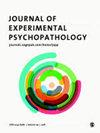The role of cognitive and affective flexibility in individual differences in the experience of experimentally induced heat pain
IF 1.9
4区 医学
Q4 PSYCHIATRY
引用次数: 1
Abstract
Adaptation to the context in which we experience pain requires cognitive flexibility (CF) and affective flexibility (AF). Deficits in both flexibility types may be precursors of more intense and prolonged pain. This study aimed to examine the relation between CF and AF, and the experience of experimentally induced pain. Furthermore, correlations between behavioral and self-report measures of flexibility were explored. CF and AF were assessed with task-switching paradigms, using neutral (numbers ranging from 1 to 9, excluding 5) or affective stimuli (positive and negative pictures), respectively. Pain sensitivity measures, such as pain threshold (°C), pain tolerance (°C), and retrospective pain experience ratings (Visual Analog Scale) were assessed for an experimentally induced heat pain stimulus. Self-reported CF was measured with a questionnaire. Results demonstrated no associations between the flexibility constructs and any of the pain outcome measures. Correlations between the behavioral and self-report measures of CF were absent or weak at best. Current results are discussed against the background of methodological considerations and prior empirical research findings, suggesting the contribution of AF in especially the recovery from pain.认知和情感灵活性在实验性热痛体验个体差异中的作用
适应我们经历疼痛的环境需要认知灵活性(CF)和情感灵活性(AF)。这两种柔韧性的缺失可能是更剧烈和持久疼痛的前兆。本研究旨在探讨CF和AF之间的关系,以及实验性疼痛的经历。此外,行为和自我报告的灵活性措施之间的相关性进行了探讨。CF和AF使用任务转换范式进行评估,分别使用中性刺激(数字范围从1到9,不包括5)或情感刺激(积极和消极图片)。对实验诱导的热痛刺激进行疼痛敏感性测量,如疼痛阈值(°C)、疼痛耐受性(°C)和回顾性疼痛体验评分(视觉模拟量表)。自我报告的CF用问卷测量。结果显示柔韧性结构和任何疼痛结果测量之间没有关联。CF的行为测量和自我报告测量之间的相关性不存在或充其量是微弱的。目前的结果是在方法学考虑和先前的实证研究结果的背景下讨论的,表明房颤的贡献,特别是从疼痛中恢复。
本文章由计算机程序翻译,如有差异,请以英文原文为准。
求助全文
约1分钟内获得全文
求助全文
来源期刊

Journal of Experimental Psychopathology
Medicine-Psychiatry and Mental Health
CiteScore
2.00
自引率
0.00%
发文量
19
审稿时长
11 weeks
期刊介绍:
The Journal of Experimental Psychopathology (EPP) is an open access, peer reviewed, journal focused on publishing cutting-edge original contributions to scientific knowledge in the general area of psychopathology. Although there will be an emphasis on publishing research which has adopted an experimental approach to describing and understanding psychopathology, the journal will also welcome submissions that make significant contributions to knowledge using other empirical methods such as correlational designs, meta-analyses, epidemiological and prospective approaches, and single-case experiments.
 求助内容:
求助内容: 应助结果提醒方式:
应助结果提醒方式:


